Movie Retrospective: The Hustler
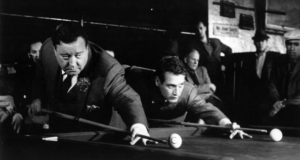
Adapted from the Walter Tevis 1959 novel of the same name, The Hustler opens in a very distinctive environment as Eddie Felson (Paul Newman) and his partner Charlie (Myron McCormick) pull up in an unnamed town. It could be anywhere in America and yet it is immediately familiar in terms of it small-town trappings and ambience. Entering a generic bar, the two men claim to be travelling salesmen on their way to a convention. Spotting a pool table in the centre of the floor, the younger man gets the urge to play some games. He’s on the hustle of course and part of the act involves him consuming beer as he misses some easy shots. ‘Too bad he can’t hold his liquor,’ an old-timer in the corner comments. When Eddie pulls off a seemingly impossible shot, he goads Charlie into betting he can’t make it again. The hook is baited and the other customers fall for the ruse. Eddie repeats the shot with ease as he takes them for their money. This is what he does best. This is his world and he is determined to be master of it.
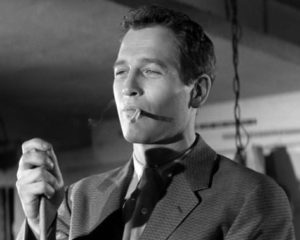
But Eddie has yet to play the great Minnesota Fats (Jackie Gleason) and he and Charlie are journeying to challenge the legendary player. Fats hasn’t been beaten in some 15 years, but Eddie is unperturbed by this. ‘I’m Eddie Felson, I shoot straight pool,’ he confidently declares as he awaits his prospective opponent on Fats’s home turf. There is a definite brashness about Eddie which is both his strength and his Achilles heel. He doesn’t believe he can be beaten. He is entirely certain of his own abilities in this setting. Fats and he agree to play for 200 dollars a game. The more seasoned of the two of them begins well and Eddie is duly impressed – ‘Look at the way he moves like a dancer,’ he remarks admiringly as Fats wins the first game with a minimum of effort. But Eddie soon moves ahead – $11,400 to be precise after they agree to up the stakes and play for a $1,000 per game. A professional gambler named Bert Gordon (George C. Scott), who is backing Fats, then enters the fray as Eddie moves further ahead. ‘Stay with this kid, he’s a loser,’ he advises Fats loudly enough so that Eddie will hear him. The strategy works perfectly as an inebriated Eddie then begins to lose and haemorrhage money. A talented pool player he may be, but the question of his own good judgement has been raised and duly answered. Eddie doesn’t know how to quit when he’s ahead. His ego also gets in the way; his arrogance will not allow him to simply walk away even as victory has been attained.
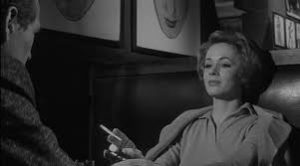
Character is a recurring word which is mentioned throughout the course of Robert Rossen’s 1961 film featuring Paul Newman in perhaps his most iconic performance. Eddie is clearly a gifted player, but a deeply flawed human being. He is self-centered and limited with respect to his interactions with others. Deciding to part ways with Charlie, he tries to pick up a young woman named Sarah (Piper Laurie) at a bus station. When he falls asleep, she pays for his coffee. Sarah is physically broken and personally impaired in a similar manner to Eddie’s emotional state. She has a limp and is an alcoholic by nature. But she realises these weaknesses and acknowledges them unlike him. When he comes on too strong, she tells him so – ‘You’re too hungry.’ Eddie is indeed hungry. His appetite for success and personal greatness is voracious. He is frustrated as he goes out by himself looking for games and grifts. Word has got out about his exploits and his marathon match with Fats. Few will take him on at the table. Most run scared because they know too well the extent of his prowess. The personal story of The Hustler comes to the fore again as Eddie runs into Sarah once more. He goes home with her and they become intimate. But the straight-talking Sarah still has her doubts. ‘I’ve got troubles. And I think you’ve got troubles. Maybe it’d be better if we left each other alone,’ she cautions. When Charlie turns up at Sarah’s apartment, the latter begins to understand the ambition which underlies Eddie’s cool facade. He desperately wants to play Fats again and beat him for once and for all. ‘You still don’t see it, do you? You’re still just a small-time Charlie,’ Eddie remarks as he refuses to go back on the road. ‘Lay down and die by yourself,’ he coldly advises his former partners as he severs all ties between them. An irate Sarah subsequently calls him a ‘pool room bum.’ She’s quite correct in this assessment of course. Eddie is content to use people including her. His sizeable aspirations supersede the needs and desires of those around him.
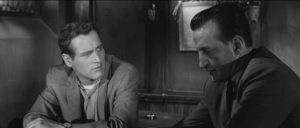
A chance encounter with Bert Gordon at a poker game is the occasion for them to tentatively discuss a business arrangement. Bert offers to help Eddie raise the $3,000 he needs to play Fats again in exchange for a 75% stake. He compliments the pool shark on his talents, but repeats his observation that Eddie is a ‘born loser.’ ‘So what beat me?’ Eddie enquires with regard to his match with Fats. ‘Character,’ Bert replies. Matters take a dramatic turn when Eddie has his thumbs broken in a seedy establishment where he has been hustling. Now he does need Sarah, and so he recuperates in her apartment. Sarah professes her love for him, but Eddie pointedly declines to reciprocate. ‘If you ever say them, I’ll never let you take them back,’ Sarah tells him in reference to the words she longs to hear from him. But Eddie is still driven by his impulses and his innate craving for glory. ‘A 25% slice of something big is better than a 100% slice of nothing at all,’ he tells Bert as he takes him up on his offer. Sarah, understandably, takes the news badly when he informs her he is returning to the road. His reasoning that, ‘I need the action and I need the money,’ means very little to her as she equates this with the beginning of the end of their relationship. ‘I wanted you to be real,’ she tells him as she bares her own soul and the truth of her existence – she was never the victim of a car crash, but, rather, has suffered from polio most of her life; the ‘rich old man’ who supports her is in fact her own father. ‘I got no idea of love,’ Eddie counters as she presses him for some sort of commitment. This is not quite true, but Eddie’s resistance to such a notion demonstrates how far he still has to go as a human being. Outside of the environs of the pool hall he is a rather bereft individual; still self-serving in the main with only a smattering of solicitude.
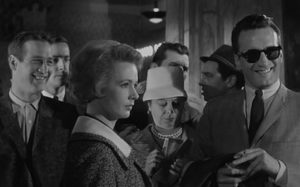
Nevertheless, he allows Sarah to accompany himself and Bert on the road. Perhaps he feels a tinge of pity for her. Perhaps there is a modicum of affection there on his part. Bert, on the other hand, is not in the least bit inclined with respect to such sentiment. Immediately on the train to Kentucky he avails of the opportunity to undermine Sarah in subtle ways; he even employs the word ‘cripple’ at one point. Gordon has arranged it so that Eddie will challenge a wealthy socialite named Findley (Murray Hamilton) who is attending the Kentucky Derby. Findley invites the three to a party which is taking place at his mansion that very same evening. A bored Sarah gets very drunk at this and reacts angrily when Gordon whispers something in her ear. Although we do not hear it, we can only imagine it is sexually suggestive. Descending to Findley’s games room in the basement of his house, Eddie and Bert discover that he is proposing a match of billiards as opposed to pool. As Eddie loses game after game, Bert once again berates him for being a loser. ‘Don’t wear a mask,’ Sarah tells him as she implores him to leave this unwholesome world which is inhabited by individuals who are, ‘perverted, twisted and crippled.’ Discerning Eddie’s anger at this statement, Bert stakes him $1,000 per game. Eddie proceeds to win $12,000 and accepts his share of $3,000. ‘You got to be hard Eddie,’ Bert advises him as he suggests he dispense with Sarah. But Bert has his own twisted motivations and, indeed, belongs to the world which Sarah has just referenced. Returning to the hotel before Eddie, he makes sexual advances on the resigned Sarah – ‘You’re a Roman Bert,’ she observes, ‘you have to win them all.’
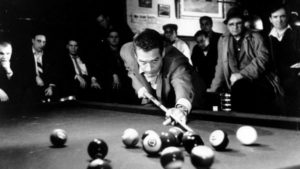
When Eddie arrives back a distraught Bert is being questioned by police. Finally broken and beyond hope, Sarah has taken her own life. On the bathroom mirror she has scrawled the words ‘perverted,’ ‘twisted,’ and ‘crippled.’ An enraged Eddie finally grasps how he and Bert have, in their own separate but callous ways, used this fragile woman. ‘I loved her Bert, I traded her on a game of pool,’ a highly motivated Eddie tells Gordon as he returns to the pool hall to challenge Fats one last time – ‘Yeah, I sure got character now. Picked it up in a hotel room in Louisville.’ A defeated Fats is eventually forced to quit after Eddie beats him game after game. Bert demands his 75% share of Eddie’s winnings, but when the latter refuses to hand the money over he allows him to leave with an unmistakable warning – ‘You’ll never walk into a big-time pool hall again.’ ‘Fat man, you shoot a great game of pool,’ Eddie says in a compliment as he departs. ‘So do you Fast Eddie,’ the gracious loser responds.
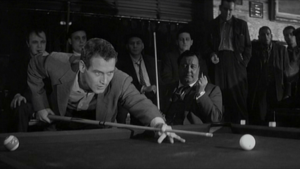
On the subject of The Hustler, the late great film critic Roger Ebert remarked as to how it is, ‘one of the few American movies in which the hero wins by surrendering, by accepting reality instead of his dreams.’ Director Rossen presents us with a stark world in which choices must eventually be made and life paths determined upon. The Hustler is concerned with the sport of pool, but this, in truth, is merely a backdrop for the personal drama at its core. Eddie does not become a better player by the film’s end, but he does become a more complete human being. Moving from his earlier assertion that, ‘I got no idea of love,’ he honestly acknowledges the part he played in Sarah’s demise. This was what Rossen meant when he subsequently noted how Eddie attempts to, ‘fulfill himself as a human being,’ to attain, ‘self-awareness.’ He has contributed substantially in this tragedy by introducing Sarah to a world which is squalid and low. Though hardly a paragon of virtue herself, Sarah recognises the vices of this world and entreats Eddie to become a better person by leaving it. The final pool match with Fats is, of course, a valediction on his part. Knowing full well that the powerful Gordon will block him in the future, he nonetheless decides to dish out a lesson in morality by means of his most potent weapon – the pool cue. Shot on location in New York City, The Hustler’s reputation as a cinematic classic is well deserved and the Oscar-winning photography by Eugene Shuftan is among its many strengths. It goes without saying that the performances of the leads are impeccable. Gleason – who only appears at the beginning and end – is perfectly cast as the lugubrious-looking Fats, a man who probably has seen it all. Scott – in one of his early roles – exudes understated viciousness and avarice in equal measure; Piper Laurie – as the ill-fated Sarah – is wonderful as the damaged heroine. The Hustler is dominated by Paul Newman’s hugely charismatic performance from first to last, but let’s also remind ourselves of the more intimate scenes he shares with Laurie at close quarters. Some 25 years later, the actor finally landed an Oscar for Best Actor for The Color of Money in which he reprised the role of Fast Eddie opposite Tom Cruise. To this day many fans and critics believe that the overdue award was more than partly in recognition of his efforts in this earlier and superior film. Personally, and with all due respect to the Martin Scorsese film, I’d go along with this line of thinking. A truly great actor in a truly great film.